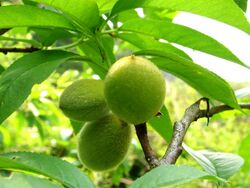Biology:Prunus davidiana
| Prunus davidiana | |
|---|---|

| |
| Scientific classification | |
| Kingdom: | Plantae |
| Clade: | Tracheophytes |
| Clade: | Angiosperms |
| Clade: | Eudicots |
| Clade: | Rosids |
| Order: | Rosales |
| Family: | Rosaceae |
| Genus: | Prunus |
| Subgenus: | Prunus subg. Prunus |
| Species: | P. davidiana
|
| Binomial name | |
| Prunus davidiana | |
| Synonyms[3] | |
| |
Prunus davidiana[4][5][6][3] (syn. Amygdalus davidiana,[1] Persica davidiana,[1][4] Prunus persica var. davidiana)[1] is a species in the genus Prunus in the family Rosaceae. It is also known by the common names David's peach[1][5] and Chinese wild peach.[1] It is native to China , preferring to grow in forests and thickets, on slopes in mountain valleys, and in waste fields, from 800 to 3200 m.[4][5] It is resistant to frost, and to a number of pests and diseases of cultivated peach, and is the subject of many studies for the genetic improvement of peaches.
Description
Deciduous, upright tree.[4][5]
- Height and Spread: Reaches a maximum height and spread of 9 m (30 ft) by 9 m (30 ft).[5]
- Branches: Young branches whippy, upright,[5] and smooth.[4]
- Bark: smooth, dark purplish-red
- Leaves: Dark green,[5] glabrous leaves are lanceolate-narrow ovate in shape, ranging in length from 5–12 cm (2–5 in).[4] Leaf point is long and slender, tapering to a point;[4][5] leaf margins finely toothed.[4][5] Petioles are glandular.[4]
- Inflorescences: Flowers in late winter-early spring[5] or in February.[4]
- Fruit: Yellow, furry, edible.[5]
Cultivation
Fully hardy. Prefers full sun.[5] In China it is largely used as an ornamental, and the fruit is eaten but not prized. In peach growing regions throughout the world it is used as a source of rootstocks.[citation needed]
Varieties
- P. davidiana var. alba has white flowers.[4]
- P. davidiana var. rubra has deep rosy-colored flowers.[4]
Etymology
Prunus is the ancient Latin name for plum trees. Davidiana is named for L'Abbé Armand David (1826-1900), a missionary and collector of Chinese plants.[7]
References
- ↑ 1.0 1.1 1.2 1.3 1.4 1.5 Rhodes, L.; Pollard, R.P.; Maxted, N. (2016). "Amygdalus davidiana". IUCN Red List of Threatened Species 2016: e.T50018774A50018778. doi:10.2305/IUCN.UK.2016-3.RLTS.T50018774A50018778.en. https://www.iucnredlist.org/species/50018774/50018778. Retrieved 11 January 2020.
- ↑ Ligneous Fl. Heilongjiang 308. 1986
- ↑ 3.0 3.1 "Prunus davidiana (Carrière) Franch. — the Plant List". http://www.theplantlist.org/tpl1.1/record/rjp-13612.
- ↑ 4.00 4.01 4.02 4.03 4.04 4.05 4.06 4.07 4.08 4.09 4.10 4.11 4.12 4.13 4.14 Chittenden, Fred J., Synge, Patrick M., editors. 1977. “The Royal Horticultural Society Dictionary of Gardening”, edn. 2, Oxford University Press. ISBN:0198691068. Volume 3, pp. 1696
- ↑ 5.00 5.01 5.02 5.03 5.04 5.05 5.06 5.07 5.08 5.09 5.10 5.11 5.12 Hogan, Sean, chief consultant. 2003, 2004. "Flora A Gardener's Encyclopedia", Global Nook Publishing Pty Ltd, Timber Press. ISBN:0881925381. Volume 2, pp. 1093
- ↑ "Prunus davidiana | David's peach/RHS Gardening". https://www.rhs.org.uk/Plants/113287/i-Prunus-davidiana-i/Details.
- ↑ Gledhill, David (2008). "The Names of Plants". Cambridge University Press. ISBN:9780521866453 (hardback), ISBN:9780521685535 (paperback). pp 135, 316
External links
Wikidata ☰ {{{from}}} entry
 |


